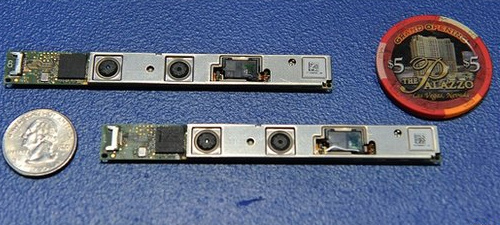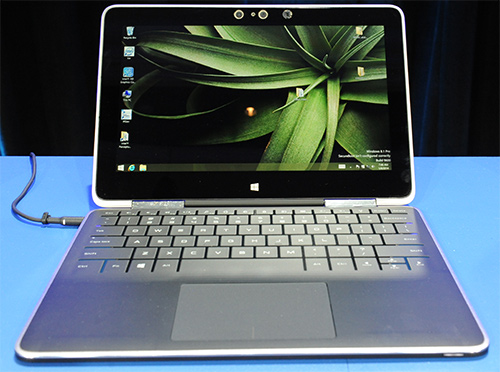In an attempt to make devices based on its chips more competitive, Intel Corp. plans to bring human-like senses to a broad range of personal computers, the company outlined at the Consumer Electronics Show this week. To make this possible, the chip giant has developed a combination of software and hardware technologies it calls RealSense and started to collaborate with third-party app designers to ensure support of its efforts.
The first product in the RealSence family and also the current corner stone of the technology is Intel RealSense 3D camera module that features a high-quality depth sensor (the company did not reveal what kind of a sensor it uses) and a full 1080p color camera (based on the image of the RS3D, two 1080p sensors, to be precise). Intel RealSense 3D (RS3D) can detect finger level movements enabling highly accurate gesture recognition, facial expressions for understanding movement and emotions. The RS3D can understand foregrounds and backgrounds to allow control, enhance interactive augmented reality, simply scan items in three dimensions, and more.
Intel RealSense 3D camera module
Intel RealSense 3D resembles Microsoft’s Kinect, but until the chip giant reveals its precise specifications and capabilities, it is impossible to say which approach is better. The RS3D is remarkably thin, which will enable device manufacturers to integrate it into a range of devices, including 2-in-1, tablet, ultrabook, notebook and all-in-one (AIO).
Mooly Eden, senior vice president and general manager of Intel’s perceptual computing group, said Intel RealSense technology will deliver new immersive experiences, including changing how people collaborate through video conferencing, enhanced learning and edutainment through augmented reality, immersive gaming, and the ability capture and share 3D images.
A Dell notebook with integrated Intel RealSense 3D camera
Many leading software developers (including, but not limited to, 3D Systems, Autodesk, DreamWorks, Metaio, Microsoft Skype and Lync Scholastic, Tencent) will add support of Intel RealSense 3D camera into their apps. For example, 3D Systems plans to bring 3D scanning and printing to the mainstream user in the second half of 2014 by updating its sense software. As a result, the student, the hobbyist and the consumer will be able to easily and affordably create compelling 3D items. Additionally, 3DS plans to make its 3D scanning technology available to developers as part of the Intel RealSense software development kit.
Systems with the new RS 3D camera will be available beginning in the second half of 2014 from Acer, Asus, Dell, Fujitsu, HP, Lenovo and NEC. On stage, Intel showcased seven different devices with the integrated camera from Dell, Lenovo and Asus.
Intel RealSense 3D camera module incorporated into a Lenovo ThinkPad laptop
To advance the computer's “hearing” sense, Intel also announced plans to pre-load Dragon Assistant software from Nuance onto a variety of systems (2-in-1s, notebooks, ultrabooks, tablets) from Acer, Asus Dell, HP, Lenovo and Toshiba this year. The new Dragon Assistant is an entirely new conversational personal assistant that works with popular websites and applications. It comes with selectable personalities, and allows for an ongoing dialogue with Intel-powered devices. People can simply tell it to play music, get answers, connect with friends and find content – all by using natural language.
KitGuru Says: Everything that Intel is doing looks to be just brilliant. Addition of motion sensors to a broad range of PCs will catalyze software makers to optimize their apps for gesture-based controls. Free Nuance Dragon Assistant on a range of computing products? Excellent idea! There is a problem: none of these are new. Those, who needed the capabilities of RS 3D and Dragon Assistant already have them. What is good about Intel’s approach is that it enables new features on a wide array of computing devices.
 KitGuru KitGuru.net – Tech News | Hardware News | Hardware Reviews | IOS | Mobile | Gaming | Graphics Cards
KitGuru KitGuru.net – Tech News | Hardware News | Hardware Reviews | IOS | Mobile | Gaming | Graphics Cards





